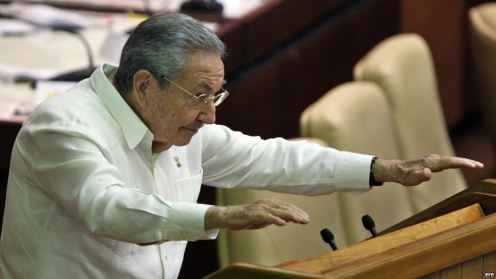
Juan Juan Almeida, 13 December 2017 — Time is an indelible and important imprint in any perspective. It is true that Cuba continues to be a country governed by a group incapable of coexisting with the opposition, beating down those who think differently, a criminal state that encourages the rupture of democracy and legality.
It is also a great truth that without Fidel Castro at the head of it, and with the bit-by-bit deaths of the historic leaders, the island loses its capacity to seduce, and today lacks the strength that allowed it to continue to be a force among certain sectors in Latin America.
The vacuum left by the largest of the Antilles is gradually being filled by the leaders of Russia and China respectively, Vladimir Putin and Xi Jinping. Both maintain a fairly aggressive line of commercial diplomacy, based on the growing importation of raw materials, loan offers, and investment agreements in infrastructure, energy and telecommunications. What should concern the US with regards to Cuba is the issue of global security.
The Maduro regime can survive without Havana. Venezuela is the main destination for Chinese investments in Latin America and Russia’s second largest trading partner in the region.
We must understand that, even with the diffuse romantic vision we have of history, Russia today is not the Soviet Union of yesterday. Moscow annulled the “Antillean Titan” when it announced the construction of an international training center in Nicaragua to provide regional training in the fight against drugs. A reasonable decision given that the Central American country has more to offer than Havana. And that’s what the Nicaraguan Vice Minister of Foreign Affairs, Luis Molina, let be known in March 2016 when he assured the Montevideo forum that his country wants to offer land to the Russians. “Of the 4.9 million hectares [12+ million acres] available in the country, only one million is being worked, the rest is waiting for the Russians …”
Nor can we say that the today’s Beijing is Mao’s China. The Asian giant has become the world’s leading economic power taking into account its gross domestic product, as well as its geo-economic and geo-strategic presence and influence in all corners of the planet. However, the Caribbean island does not seem a priority for the golden dragon. Chinese exports to Cuba plummeted in 2017, dropping nearly 30% compared to the same period last year.
The trade between China and Bolivia is remarkable considering the volume of the economy and the Bolivian market. Chinese investments in that nation exceed three billion dollars in mining activities, construction of infrastructure and roads. At the moment, China intends to participate in the megaproject that proposes to build a way to connect the Pacific and Atlantic Oceans.
Without looking away from an island where the rights and freedoms of all its citizens are constantly violated, we should accept that, today, the regional danger is not located in Cuba but in this Russian-Chinese alliance that is emerging as a new world power with an explicit policy — with its overarching geo-influence in our hemisphere — to de-dollarize the world, to extend the use of the encrypted currency. Keep an eye on that.
Maybe it’s a bit late but I want to recall an old saying that my grandmother often repeated when I was about to make a mistake: “The best way to prevent a problem is to stop it before it is one.”
